The HVAC industry, especially the mechanical ventilation aspect is becoming more and more challenging these days. When you call one of the world’s top livable cities your home, it’s no surprise that people from all over the world want to flock and build their lives here. But on the flip side, due to the booming population, property values becoming dearer and not to mention thousands of cars added onto the roads every year, tackling car parking areas is one of the major issues for councils in these cities.

The most logical solution in this scenario is an enclosed car park. Enclosed car parks are a common feature in many cities and towns, providing convenient parking options for drivers. However, these facilities can also be a source of danger due to poor ventilation. Without proper ventilation, enclosed car parks can become hazardous to human health and safety and also the structural longevity of the building.
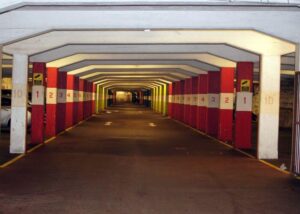
Some of the dangers one needs to keep in consideration when designing and calculating for an enclosed car park ventilation are as follows:
Carbon Monoxide/ Nitrogen Dioxide Poisoning:
We can’t stress enough on this topic. Carbon Monoxide is a poisonous, odourless, colourless and tasteless gas that is produced when fuels such as gasoline, diesel, and propane are burned. Vehicle exhaust emissions, mainly from diesel engines, release nitrogen dioxide gas. In enclosed car parks, CO levels can accumulate, leading to respiratory irritation, inflammation of the airways, and exacerbation of asthma symptoms. Without proper ventilation and a poor fresh air change rate, these toxic gases build up and can pose serious dangers to anyone accessing the basement car park.
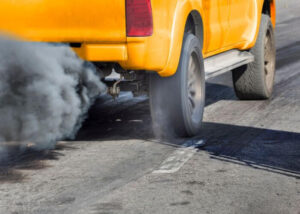
Before you know it, prolonged exposure to carbon monoxide and nitrogen dioxide may increase the risk of respiratory infections and other respiratory diseases and can cause headaches, dizziness, nausea, confusion, and even death in severe cases. With our range of smart gas sensors that can detect toxic gases like CO, NO2 etc, along with our revolutionary Jet Fans for basement car park ventilation, the iJETFAN, learn how our engineers at iHVAC automate the whole process and make it easier to maintain fresh air change rate seamlessly controlled via an interactive 7” HMI touch screen. Our top-of-the-line controls system, the iJETCON, when paired with our intelligent car park ventilation fan, the iJETFAN, provides an unmatched efficient end eco-friendly basement car park ventilation solution.
Poor Air Quality:
Carbon monoxide and Nitrogen dioxide is not the only toxic gas that poses a serious threat to pedestrians and drivers accessing an enclosed car park. Car parks may contain high levels of particulate matter, which consists of tiny particles suspended in the air. These particles can be released by exhaust emissions, tire wear, and other sources. Fine particulate matter (PM2.5) can penetrate deep into the lungs and enter the bloodstream, contributing to respiratory problems, cardiovascular issues, and other health problems.

Enclosed car parks can also contain various volatile organic compounds emitted by vehicles, such as benzene, formaldehyde, and toluene. VOCs can have both short-term and long-term health effects, including eye and throat irritation, headaches, dizziness, and, in some cases, damage to the liver, kidneys, and central nervous system.

It is important to keep this in consideration when doing CFD analysis of car park ventilation and adhering to the recommendations stated in Australian Standards AS 1668.2 and maintaining the recommended fresh air change rate of the car park. iHVAC’s intelligent car park ventilation solution, the iJETFAN, when installed along with our range of intelligent controls system and sensors, the iJETCON, automates the whole process for you and can be seamlessly integrated with the Building Management System (BMS) for convenience.
Fire Hazards:
Ventilation systems in basement car parks are crucial for maintaining air quality and reducing the risk of fire hazards. Without proper ventilation, the accumulation of exhaust fumes, gasoline vapours, and other pollutants can pose a serious threat to both occupants and the structure itself. The following needs to be kept in mind regarding fire hazards in a basement car park ventilation design:
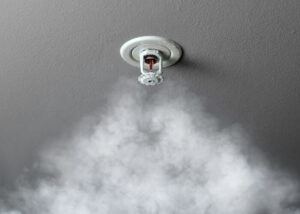
- Combustible materials: Basement car parks often contain combustible materials like gasoline, oil, and other flammable substances present in vehicles. Adequate ventilation helps prevent these vapours’ buildup, reducing the risk of fire.
- Smoke control: In the event of a fire, an effective ventilation system assists in controlling smoke by exhausting it out of the car park. This helps to improve visibility for evacuation and firefighting efforts, as well as limiting smoke damage to the structure.
- Heat dissipation: Ventilation also aids in dissipating heat generated by vehicles and potential fires. High temperatures can accelerate fire spread and compromise the structural integrity of the car park. Proper ventilation design ensures heat is removed to maintain a safe environment.
- Fire detection and suppression: Basement car parks should be equipped with fire detection systems that can trigger the ventilation system to activate in case of a fire. Additionally, fire suppression measures like sprinklers or foam systems can work with ventilation to control or extinguish fires.
iHVAC’s range of intelligent sensors like temperature sensors, gas sensors, humidity sensors etc in conjunction with our intelligent car park control system, the iJETCON, can be integrated with any selection of fans or BMS and automate processes. Talk to our engineering team to see how we can make your current ventilation system and selection of fans intelligent and smart.
Mould Growth:
Mould growth in a poorly ventilated basement car park can be a significant hazard for several reasons. Mould thrives in damp and humid environments, and a lack of proper ventilation can contribute to these conditions.
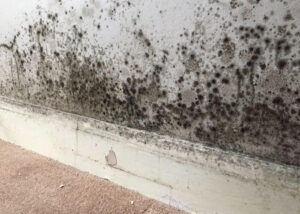
- Health Risks: Mould releases spores into the air, which can cause respiratory problems, allergies, and other health issues. Prolonged exposure to mould spores in a poorly ventilated basement car park can lead to respiratory irritation, asthma attacks, and allergic reactions.
- Safety Concerns: Mould growth can create slippery surfaces, increasing the risk of accidents and falls. This is especially problematic in a car park where vehicles and pedestrians frequently move around. Additionally, mould can compromise the integrity of electrical systems, posing a fire hazard.
- Odour and Air Quality: Mould growth is often accompanied by a musty odour, which can permeate the air in the car park. This unpleasant smell can impact the overall air quality, making it uncomfortable for people using the facility.
iHVAC’s smart control system, the iJETCON, along with our selection of smart humidity sensors, can help you control the humidity of an enclosed car park and minimise the hazards associated with the same. Our intelligent sensors can be optimised to their peak efficiency in conjunction with our eco-friendly and intelligent jetfan, the iJETFAN. To learn more about our intelligent and smart car park solutions, get in touch with our engineering team today.
Structural Damage:
A poorly ventilated basement car park can lead to several structural issues over time. If these issues are not addressed in a timely manner, the building owners and management can cop millions of dollars in rectification of these damages which can be a major safety concern to everyone accessing the building.
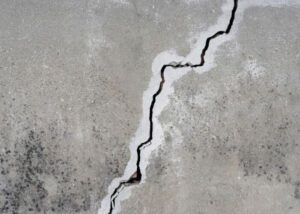
- Moisture Accumulation: Insufficient ventilation can result in excessive moisture buildup in the car park. This can occur due to condensation from vehicles, water leaks, or high humidity levels. When moisture is trapped in the environment, it can seep into the building materials, leading to damage and deterioration.
- Mould and Mildew Growth: Moisture-laden environments provide ideal conditions for mould and mildew to flourish. Mould can grow on walls, ceilings, floors, and other surfaces, causing discolouration, decay, and structural damage. Mould growth not only compromises the aesthetics of the car park but also poses health risks to occupants.
- Corrosion: Inadequate ventilation can contribute to the corrosion of metal components within the car park, such as structural supports, beams, and reinforcements. High humidity levels, combined with the presence of pollutants like vehicle emissions, can accelerate the corrosion process. Corrosion weakens the structural integrity of the car park, leading to safety concerns.
- Concrete Damage: Moisture and trapped humidity can adversely affect the concrete used in the construction of the car park. It can lead to the deterioration of concrete surfaces, including cracks, spalling (surface flaking), and efflorescence (white powdery residue). Over time, this can compromise the strength and stability of the structure.
- Structural Weakness: Continuous exposure to high humidity levels and moisture can weaken the structural components of the car park. This includes beams, columns, walls, and the overall foundation. Weakened structures are at a higher risk of structural failure, posing significant safety hazards to occupants and vehicles within the car park.
- Electrical System Issues: Moisture and condensation can affect electrical systems within the car park. Wiring, junction boxes, and electrical fixtures may be exposed to moisture, increasing the risk of short circuits, malfunctions, and potential fire hazards.
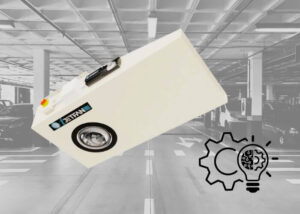
All the above hazards can be easily addressed to avoid millions of dollars in future costs to the building owners and management. Discuss with our expert team of mechanical and electrical engineers to discuss needs to your ventilation requirements and how iHVAC’s intelligent car park jetfan, the iJETFAN coupled with our smart controls solution, the iJETCON, can automate the whole process and save you millions of dollars in the long run by efficiently addressing all the above issues. Get in touch and talk to our team today!
